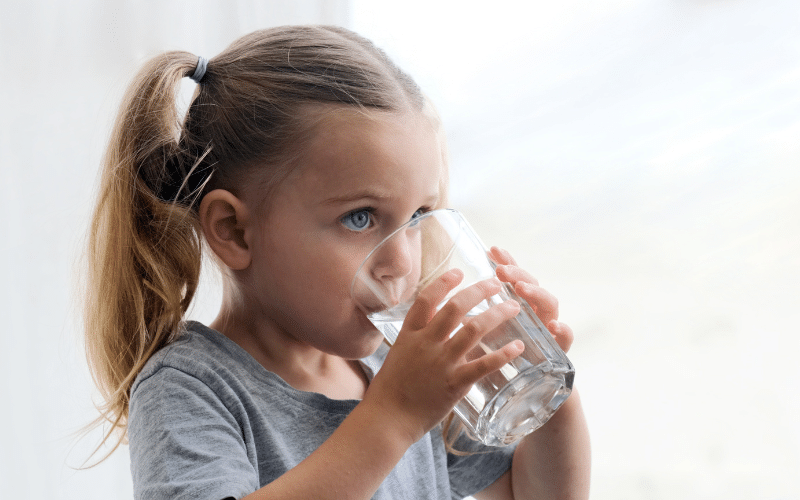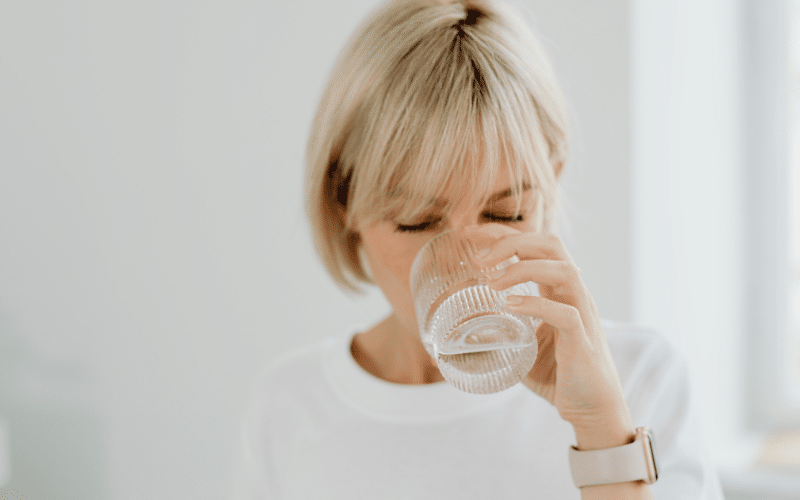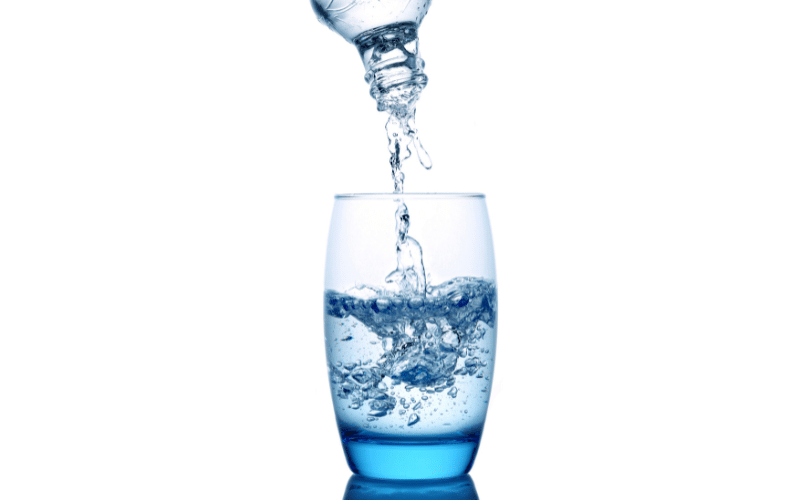More and more people are turning to distilled water for their daily hydration, from health-conscious families to professionals in the medical and dental fields. What’s driving this shift? In this article, we’ll explore the benefits of distilled water, covering what distilled water is, its purity and health advantages, its use in healthcare settings, and answering the common question: is distilled water safe to drink? Along the way, we’ll share expert insights and explain why Paradise Bottled Water, a trusted local supplier, advocates distilled water as a pure and safe choice for your home or business.
What Is Distilled Water?
Distilled water is water that has been purified through distillation, a process that involves boiling water into steam and then condensing the steam back into liquid form. This process removes impurities, salts, minerals, and contaminants, resulting in exceptionally pure H₂O. Unlike spring or mineral water, which contain natural minerals, distilled water is free of virtually all dissolved solids and contaminants.
- During distillation, water is heated to produce vapor, leaving behind heavier substances like inorganic minerals, metals, and bacteria. The steam is then cooled and collected as clean water.
- The result is ultra-pure water, often considered the purest form of water available for consumption or industrial use.
- Distilled water is actually a type of “purified water.” In fact, U.S. FDA guidelines allow water treated by distillation (or other advanced processes) to be labeled as purified water, provided it meets strict quality standards.
Key point: If you’ve ever seen condensation on a lid while boiling water, that liquid is essentially distilled water. By capturing that pure steam and leaving behind contaminants, we get water with unparalleled purity.

Purity and Health Benefits of Distilled Water
One of the biggest benefits of distilled water is its unmatched purity. Because distillation removes contaminants, many people choose distilled water to avoid potential pollutants found in tap water. Here are some health-focused advantages of drinking or using distilled water:
- No Chemical Residues: Distilled water contains no chlorine, chloramine, or fluoride additives that treated tap water might have. It’s also free from nitrates, pesticides, and other chemicals that can seep into ground water. This makes it appealing for those who want to minimize their exposure to such substances.
- No Heavy Metals or Toxins: The distillation process eliminates heavy metals like lead, mercury, and arsenic if they were present in the source water. These contaminants have been linked to various health issues, so removing them can provide peace of mind.
- Neutral Taste for Beverages: Many coffee and tea aficionados use distilled water for brewing. Without minerals or chlorine, distilled water has a very clean, neutral taste, allowing the pure flavor of your coffee or tea to shine. Some find other water types impart off-flavors, whereas distilled water is taste-neutral (any “flat” taste is simply the absence of minerals, a quality many prefer).
- Ideal for Specific Diets or Health Needs: For individuals on low-sodium or controlled-mineral diets, distilled water is an excellent choice because it contains virtually zero sodium and no minerals. Health professionals sometimes recommend distilled water for people with weakened immune systems or certain health conditions, for example, when even trace contaminants in water could pose risks. It’s also commonly used in preparing baby formula or medical solutions, where purity is crucial.
- Avoiding “Hard Water” Issues: If your tap water is “hard” (high in calcium or magnesium), using distilled water can help avoid the downsides of hard water. Hard water minerals can contribute to kidney stones in susceptible individuals, and they often leave scale deposits in kettles or humidifiers. Distilled water has these minerals removed, which can be gentler on both your body and your appliances.
Emerging Contaminants: PFAS and Distilled Water
In recent years, public concern has grown around PFAS (per- and polyfluoroalkyl substances), also known as “forever chemicals,” in drinking water. These industrial chemicals have been detected in many water supplies and are linked to health risks. One remarkable benefit of distilled water is that the distillation process is highly effective at removing PFAS compounds. Studies show that during distillation, PFAS chemicals do not evaporate with the water vapor, they remain behind with other impurities. This means the distilled water you collect is free of PFAS. In fact, distillation is noted as one of the most reliable methods to eliminate PFAS, providing peace of mind that emerging contaminants are removed.
Real-world example: In Paradise Bottled Water’s home region of Kennewick (Tri-Cities, Washington), recent tests found elevated PFAS levels in a municipal water source. This has led many local residents and businesses to seek purified water alternatives. Distilled water offers a safe alternative in such scenarios, it’s a way to ensure that even newly recognized contaminants like PFOS/PFOA are not in your drinking supply.
Uses of Distilled Water in Medical and Dental Industries
Distilled water isn’t just for drinking, its purity makes it indispensable in healthcare, laboratories, and various industries. If you work in a dental office, medical clinic, or lab, you’re likely familiar with the requirement for distilled water in many applications:
- Dental Autoclaves (Sterilizers): Dentists and oral surgeons rely on autoclave machines to sterilize instruments. Manufacturers of autoclaves strictly require the use of distilled water for these devices. Using tap water, even filtered tap water, can leave mineral deposits and impurities that gum up the machinery or cause the sterilization cycle to fail. Distilled water, being free of minerals and contaminants, prevents buildup and ensures instruments are sterilized properly. In fact, modern autoclaves often have sensors that won’t even run unless the water is sufficiently pure. This underscores that distilled water is ideal for sterilization equipment – it protects expensive medical devices from damage and helps keep patients safe.
- Dental Unit Water Lines: Beyond sterilizers, distilled water is often used in dental unit water lines and for irrigating during dental procedures. It’s free of bacteria and sediment that could otherwise enter the patient’s mouth or the dental equipment. Using distilled water along with proper sanitization helps dental practices meet infection control standards, ensuring that no harmful microbes (like E. coli or Legionella) from the water supply end up in patient care areas.
- Medical Devices and Labs: Many medical devices specify distilled water. CPAP machines, for instance, recommend distilled water in their humidifiers to prevent mineral buildup and ensure the air you breathe is clean. Clinical laboratories use distilled water for mixing reagents and cleaning equipment, since any impurities could alter test results. Hospitals use distilled (or similarly purified) water for cleaning wounds and in certain respiratory treatments, again to avoid any contaminants.
- Pharmacies and Dialysis: Pharmacies may use distilled water when compounding medications to ensure no unintended ions or microbes are in the mix. Dialysis centers require extremely pure water (usually multi-stage purified, which can include distillation or reverse osmosis) to mix dialysate for patients with kidney failure – impure water in that context could be very dangerous.
- Other Professional Uses: Distilled water is used in autoclaves not just at dental offices but also in medical clinics, tattoo parlors, and veterinary clinics for the same reasons – to prevent residue and ensure effective sterilization. It’s also utilized in laboratories for cleaning glassware and preparing solutions, in cosmetic formulation, and even in industrial settings where mineral-free water is needed for cooling systems or manufacturing processes.
Bottom line: Distilled water’s purity makes it the gold standard wherever water comes into direct contact with sensitive equipment or is involved in patient care. It’s no surprise that dental and medical professionals keep gallons of distilled water on hand – it’s a simple step to maintain high safety and quality standards.

Is Distilled Water Safe to Drink?
One of the most common questions consumers have is, “Is distilled water safe to drink?” The answer is yes, for the vast majority of people, distilled water is perfectly safe to drink. In fact, distilled water meets the same safety requirements as any other potable water, and it’s free from many impurities found in tap water. But let’s address the specifics and some myths:
- No, it doesn’t leach minerals from your body: A persistent myth is that mineral-free water will somehow pull minerals out of your teeth or bones. This is not scientifically accurate. The human body regulates mineral levels through diet and biological processes, not by leaching them out via the water you drink. According to the National Institutes of Health, the digestive system is responsible for absorbing minerals from food; the type of water you drink (whether it has minerals or not) doesn’t strip your body of nutrients. So, you don’t need to worry that drinking distilled water will deplete your electrolytes or minerals – it won’t.
- Hydration is the same with distilled water: Some people wonder if distilled water is “less hydrating” because it lacks minerals. In reality, dehydration is caused by inadequate fluid intake, not the absence of minerals in the water. Distilled water will hydrate you just as well as any other water. The World Health Organization (WHO) confirms that drinking distilled water does not cause dehydration, as long as you eat a balanced diet, your body’s electrolyte needs will be met from food and overall fluid intake.
- We get our minerals from food, not water: It’s true that natural water contains minerals like calcium, magnesium, and potassium, which are essential nutrients. However, the primary source of these minerals is your diet, not your drinking water. A WHO study noted that while distilled water doesn’t provide minerals, the body predominantly obtains essential minerals from foods, rendering the contribution from drinking water comparatively minor. For example, you’d get far more calcium from a glass of milk or a serving of vegetables than you would from a glass of mineral water. Thus, if you maintain a normal, nutritious diet, drinking mineral-free water is not a health issue.
- Balance and taste considerations: Some critics point out that distilled water has no minerals and can be slightly more acidic (as it absorbs a bit of carbon dioxide from the air, forming carbonic acid). In practice, this slight acidity is not harmful, orange juice or coffee is far more acidic than distilled water, for context. As for taste, distilled water might taste “flat” to those used to mineral water, because minerals do enhance flavor. But many people actually enjoy the clean taste, or don’t mind it, especially when the water is cold or mixed in beverages. If you miss the minerals, remember you’re likely getting them from food. And if taste is a concern, you can always add a squeeze of lemon or use a mix of distilled and spring water for drinking to introduce a bit of mineral content for flavor.
- Regulatory assurances: From a regulatory standpoint, distilled water is held to high safety standards. In the United States, bottled distilled water is regulated by the FDA as a type of bottled drinking water. Federal regulations require bottled water to meet safety levels for contaminants just like municipal tap water does – in many cases, the allowable levels for impurities in bottled water are equal to or stricter than those for tap water. Reputable bottled water providers will also conduct regular testing and produce water quality reports to verify purity. Paradise Bottled Water, for instance, publishes a Water Quality Report and adheres to rigorous quality controls to ensure that our distilled water is safe, clean, and compliant with all standards.
In summary, distilled water is safe to drink. The key is to use it as part of an overall healthy lifestyle, which includes getting your essential minerals from a well-rounded diet. For most people, the lack of minerals in distilled water is a non-issue health-wise, and the absence of contaminants is a major plus. If you have specific health conditions that affect your mineral needs, you can consult a healthcare provider, but generally, distilled water can be a safe, refreshing part of your daily hydration.

Why People Are Making the Switch to Distilled Water
With the benefits and facts outlined above, it’s clear why many individuals and businesses are switching to distilled water for their hydration needs:
- Health and Safety Concerns: News of contaminants in water supplies, whether it’s lead, PFAS, agricultural runoff, or microbes, has made people more cautious. Distilled water offers an extra level of security because it virtually eliminates contaminants. It’s an attractive option for those with sensitive health (like pregnant women, infants, or immunocompromised individuals) and for anyone who just doesn’t want to worry about what’s lurking in their water.
- Quality for Appliances and Equipment: If you’ve invested in appliances like espresso machines, humidifiers, or CPAP machines, using distilled water can prolong their life. It prevents the mineral scale build-up you’d get from tap water, meaning less frequent cleaning and fewer malfunctions. Many people switch to distilled for their home appliances for this very reason, it’s a simple way to protect your investments.
- Consistency and Peace of Mind: Distilled water provides a consistent product every time, pure H₂O. If you’ve ever been troubled by the changing taste or smell of tap water (which can vary by season or municipal treatment changes), distilled water is reliably neutral. This consistency is appealing both at home and in professional settings (e.g., coffee shops that want their brew to taste the same every day, or dental offices that require consistent water quality for equipment).
- One Solution for Multiple Uses: By keeping distilled water on hand, you have a versatile water supply. The same gallon of distilled water can fill your drinking pitcher, top off your car battery (yes, distilled is recommended for that too to avoid corrosion), and be used in your iron or steamer. Instead of juggling different water types for different uses, some households simplify by using distilled water for nearly everything.
- Trust in Providers: Some people are making the switch because reliable suppliers (like Paradise Bottled Water) have made distilled water more accessible than ever. You can get distilled water delivered to your home or office, saving the hassle of frequent store runs. With trustworthy local providers who ensure quality, it’s easier to take the leap into using distilled water full-time or in greater quantities.
Paradise Bottled Water’s Perspective: Pure Quality from a Trusted Local Supplier
Paradise Bottled Water, based in Kennewick, WA, has been a proponent of pure distilled water for decades. As a locally owned company since 1984, we have a long history of delivering safe, clean water to the community. Here’s how we ensure expertise, authority, and trust (EEAT) in every bottle of distilled water we provide:
- Advanced Purification Process: Paradise Bottled Water specializes in vapor-distilled water, which is an advanced form of distillation. Our water goes through multiple purification steps – first reverse osmosis filtration, then vapor distillation at 218°F, followed by UV and carbon filtering for polish. This results in 99.9% pure water that is free from inorganic minerals, heavy metals, chlorine, volatile organic chemicals, and biological contaminants. We are confident in saying that our distilled water is among the purest you can find.
- Quality Control and Compliance: We operate under strict quality standards. Each batch of water is tested to ensure it meets or exceeds FDA and EPA guidelines for drinking water safety. Our bottling facilities follow current Good Manufacturing Practices, and we undergo regular audits. This diligence is part of why thousands of local customers trust us for their hydration needs.
- Serving Health Professionals: Over the years, we’ve supplied distilled water to many health-related businesses – from dental clinics and medical offices to labs in the Tri-Cities region. These professionals trust Paradise because they know our water will be pure and consistent every time. We understand the critical role water quality plays in patient care and equipment maintenance, and we’re proud to be a local partner for healthcare providers seeking top-quality distilled water.
- Community Trust and Experience: Paradise Bottled Water has been serving the Tri-Cities and Yakima Valley for over 40 years. That experience isn’t just a number, it means we have deep knowledge of water quality issues in our area (like the PFAS situation) and long-standing relationships with customers who rely on us. We’ve built our reputation on reliability, honesty, and outstanding service. When you choose our distilled water, you’re choosing a supplier that the community knows and trusts.
- Sustainability and Safety in Packaging: Our distilled water comes in BPA-free, reusable bottles, ensuring that the purity of the water is maintained and no unwanted chemicals leach into it. We also prioritize environmentally friendly practices, such as reusing and recycling our large water jugs. That means when you get distilled water from Paradise, you’re also making a greener choice compared to single-use plastic bottles.
Frequently Asked Questions (FAQ) About Distilled Water
A: Yes. For most people, drinking distilled water daily is fine, as long as you eat a balanced diet. Distilled water is pure and lacks minerals, but you’ll get essential minerals from foods or other beverages. Health authorities note that long-term consumption of distilled water is safe if you maintain a nutritious diet. Always ensure the distilled water comes from a reputable source so you know it’s been produced and stored safely.
A: No, distilled water has had all minerals removed. It contains no calcium, magnesium, sodium, etc. While that makes it extremely pure, it also means you’re not getting those minerals from your water. However, this isn’t typically a problem – your body gets minerals from the foods you eat. If you prefer water with minerals for taste or dietary reasons, you might alternate between distilled and mineral water, or simply ensure your diet provides what you need.
A: It depends on your needs. Spring water comes from natural sources and contains minerals, which some enjoy for taste. Purified water is a broad term for water that’s been filtered or treated to remove impurities (distilled water is actually one type of purified water). Distilled water is arguably the purest, since distillation removes more contaminants than standard carbon filters or even typical reverse osmosis. If your priority is maximum purity – for health reasons, appliance care, or peace of mind – distilled water is often the top choice. On the other hand, if you want some mineral content for taste or nutrition, a mineral or spring water might be preferable. Many people use a mix: distilled water for things like cooking, coffee, or specific uses, and another drinking water for everyday hydration. In short, “better” is subjective to your goals, but distilled offers unrivaled purity.
A: Store distilled water in a clean container, preferably made of glass or food-grade plastic, in a cool, dark place. Keep it sealed to prevent it from absorbing odors or carbon dioxide from the air (distilled water can be slightly “hungry” for carbon dioxide, which can eventually change its taste or pH). If it’s in a sealed bottle, distilled water has a very long shelf life because there’s nothing in it to “spoil.” Once opened, it’s best to use it within a few months for optimal quality, though it won’t go bad in the way that perishable drinks do. Always use clean hands or a clean dispenser to avoid introducing bacteria into your storage container.
A: If you’re in the Tri-Cities, Yakima, or surrounding areas in Washington state, you’re in luck – Paradise Bottled Water provides premium vapor-distilled water delivered right to your door. For those outside our service region, look for trusted bottled water suppliers or grocery stores that carry distilled water. Ensure the product is labeled “distilled” and comes from a company with good safety standards. For large or regular needs (like offices or medical use), consider a water delivery service (like Paradise) that can supply 3 or 5-gallon jugs of distilled water on a schedule. This is often more convenient and cost-effective than buying lots of small bottles.
Distilled water offers a combination of purity, safety, and versatility that’s hard to beat. Whether you’re considering it for health reasons, for use in your workplace, or simply for better-tasting coffee in the morning, the benefits of distilled water are clear. By understanding the facts and relying on credible suppliers, you can make an informed choice about incorporating distilled water into your life. At Paradise Bottled Water, we’re here to answer any further questions and provide the pure refreshment of distilled water whenever you need it. Cheers to your health and hydration!



